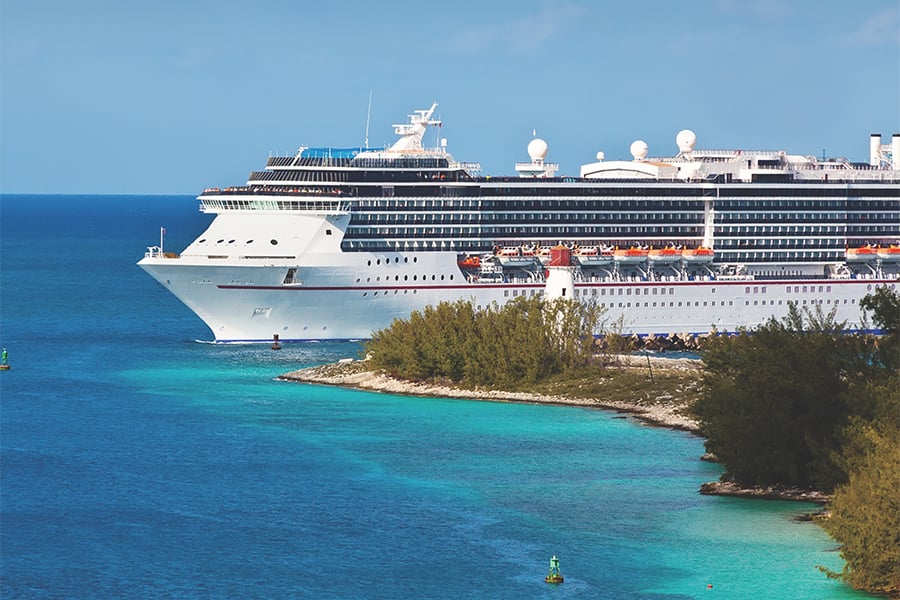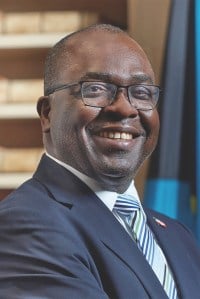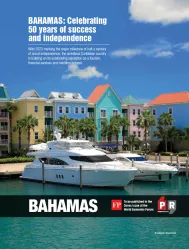Experienced maritime body BMA has a steady hand on the tiller
The BMA’s main tasks are to register vessels; enforce shipboard safety, environment and security requirements; and to represent the Bahamas in international maritime fora

The Bahamas offers a dynamic regulatory regime for all classes and types of ships.
The importance of the maritime sector to the Bahamian economy, cannot be understated, given that it is the third largest contributor to its GDP after tourism and the financial services sectors. Captain Dwain Hutchinson, Managing Director and CEO of the Bahamas Maritime Authority (BMA), is the respected figurehead at the helm of the key entity. He takes time out from his busy schedule to tell us more.
PR: Following the pandemic and global supply chain crisis, how has the maritime industry changed, adapted and evolved?
DH: First and foremost, one of our strategic objectives has always been to provide a quality customer service that allows our vessels to continue to operate. Because of the pandemic we had to advance a lot of the processes that we already had in place and a lot of what was implemented centered around automation and leveraging of the online tools. That became a big part of the BMA’s ability to continue to support the industry. This agility was reflected globally within shipping, because throughout the pandemic the ships continued trading, carrying essential goods to sustain communities and the global economy.
There was one exception, however, as the passenger cruise industry was shut down as it is tourism driven. The Bahamas is the number one flag for the cruise ship sector; we have over 140 cruise ships on our registry and during the pandemic many of those vessels were not able to operate commercially. However, they still had crews on board and this is one aspect that we are really proud of, as we supported the industry and also the broader fleet in terms of facilitating crew repatriation. We recognized and designated seafarers as essential workers and made it possible for the crew to go to and from their homes, and to and from their place of employment, that is to say the ships. At its peak, the Bahamas had over 77 cruise ships, of all flags, physically in our waters with over 50,000 seafaring persons on board and the Bahamas government utilized emergency measures to allow these ships to be present — safely shelter — in our waters and engage in crew changes.

PR: What initiatives and projects are you busy with to ensure you offer world-class services?
DH: We are a regulatory body, but also a customer service provider. One key area of focus is the leveraging of technology to strengthen our online service offering with the aim of greater efficiency and cost effectiveness for our customers aligned with the mutual environmental benefits from the reduction in the use of paper. This project has the customer at its heart as we draw from the invaluable feedback that has been shared to facilitate the development of the online services.
PR: How does BMA partner with international cruise line operators to strengthen the tourism experience of the Bahamas?
DH: We work with all the leading cruise companies from conception to the design and construction stage through to vessel operation. This partnership ensures a ship meets its delivery target, allowing it to take its customers to the Bahamas. Shipping is a 24/7 business, so we work with the owners on a regular basis to address any questions or concerns that they may have to make sure the ships continue to operate. If there is a problem with the ship or a delay in port in the Caribbean or the US, the vessel along with its many passengers may not be able to visit the Bahamas, so we want to work with the owners to ensure that doesn’t happen.
PR: How is the Bahamas strengthening collaboration to support the global maritime industry?
DH: The BMA has a team of competent and experienced marine professionals who participate in every single meeting of the International Maritime Organization (IMO), International Labour Organisation (ILO) seafarers’ meetings and Caribbean regional meetings. These intergovernmental meetings coupled with regular engagements with industry stakeholders, including our shipowners, enables formulation of effective national policies. We are very much about communication and collaboration with industry stakeholders, where the aim is for regulations and guidance that can be implemented onboard the ship. If it works for the ship, then it works for the seafarers; if it works for the seafarers, then it works for the broader economy.
PR: What is your final message to the global shipping community and strategic investors about choosing the Bahamas as the best destination for shipping?
DH: The BMA is focusing on three things critical to shipping in the Bahamas and the broader world. Firstly the human element, there has to be a continued commitment to invest in the next generation of seafarers and attract people to our industry, which needs not only capable, trained and motivated persons on the ships but also the same talent ashore supporting the shipboard team. Secondly the environment, the industry is fully aware of all the issues relating to climate change. As a small island developing country, we are fully supportive of the IMO greenhouse gas strategy. The Bahamas has been very much at the forefront of regulatory discussion and we are pleased that we continue to attract owners who are innovative in their thinking, prepared to be first movers and advocate for a goal-based approach to the regulatory process. The last point is innovation through technology, which is critical for long-term global development. Progress is one of the authority’s core values and this is being embraced in the development of our online services. The authority has been in existence since 1995 so we have a solid foundation, and respected reputation, to make sure that your investment will be safe in the Bahamas.
Report Contents:

 Download the PDF
Download the PDF